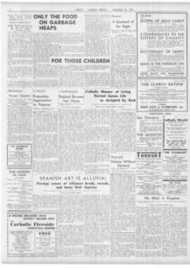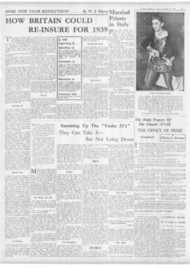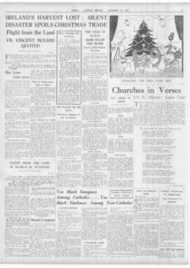Page 12, 30th December 1938
Page 12

Report an error
Noticed an error on this page?If you've noticed an error in this article please click here to report it.
Tags
Share
Related articles
Jubilee
Buckfast On Tv T He Englishness Of The Buckfast Abbey Of
New Abbot Of Buckfast
Tv No Bother To Buckfast
Mother M. Cecilia Dunne
The Abbot of Buckfast
Christmaritide has been eaddened for the community at Buckfast Abbey by the death, last Monday Morning, of their monastic pastor of upwards of thirty-two years. Deep sympathy with the monks of the Devon abbey can be extended, both to religious and laity, in a very wide radius, for Dom Anscar Vonier's death means not only the loss of a ruler to his own cloistered flock, but a loss also to literature and to the pulpit. The late abbot was prolific in authorship, be.eides being a preacher of repute whose voice had been heard in many parts of the country.
Anscar Vonier, 0.8.13., Ph.D., was born in 1875 at Wiirttemberg. He was a boy of seven when the band of monks from Pierre-qui-Vire came to England and colonised, on the Dart, the historic property that had once been Buckfast Abbey and was by their coming to be Buckfast Abbey again—the only English Benedictine abbey recovered for the Order out of the many houses dissolved under Henry the Eighth. With Buckfast Dom Anscar had almost a lifelong association; the Devon monastery gave him part of his education, received his profession, and for long was under his professive care.
Before he became Abbot, Dr. Venter was for a short time professor of philosophy at Sant' Aneelmo, in Rome, where he had completed his own ecclesiastical studies. His appointment was in 1905, but before the close of the following year he was back in England as successor to Dom Boniface Natter, who had met with a tragic fate by shipwreck. The new abbot was among those who had been saved in that disaster. He received the abbotical blessing at the hands of the then Bishop of Plymouth, Mgr. Graham, in October, 1906, thus becoming a ruling abbot at the early age of 31.
The history of Buckfast Abbey during the past 32 years is so well known, its chief events have been so widely recorded that it is only needful here to point to the consoling fact that it was given to Abbot Vonier not only to watch over the extension of the monastery and the gradual rise of the handsome abbey church, but to rejoice with his brethren on the great day of the consecration. He lived also long enough to see, but a week or two before his death, the final piece of building on the tower, which marked, in St. Mary's Abbey Church, the completion of a memorable task.
It has been said above that the late Abbot's work as a writer was prolific. That this was so is proved by a list of his books. But Dom Anscar's literary output is to be judged by other criteria than that of mere quantity. A depth of thought characterises his published works, some of which reproduce, in substance, courses of sermons, while others are independent essays on the theological or devotional themes.
In 1913 an early book, The Human Soul, appeared, and two years later came The Personality of Christ. From then until after the end of the Great War there was a break; but in 1921 the literary stream began a flow which thenceforth was to leave few years unrepresented by some newly-published work.
Without attempting to follow either the chronology or the full extent, we may cite some of Dorn Anscar's titlepages in proof of the richness of the field over which his thought and genius ranged in a style that proclaimed. him to be, although a man of foreign birth, a master of the English tongue : The Christian Mind, The Divine Motherhood, The An of Christ, The Angels, The Life of the World to Come, Death and Judg
blog comments powered by Disqus















